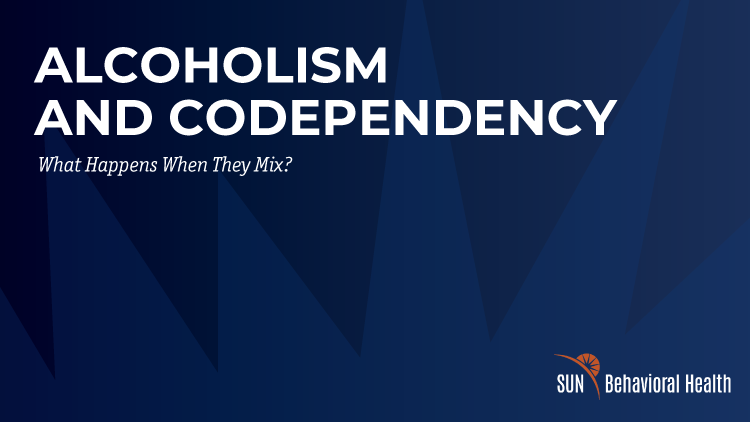Services
- Home
- Mental Health
- Who We Treat
- How We Treat
- Patients & Visitors
- About
- Lexington
close

After getting married, one partner started binge drinking every night. The other partner feels like they can only be satisfied if their partner is happy. Since their partner is only happy when they are drinking, they allow their partner to drink more often. The partner who doesn’t drink alcohol creates excuses for their partner’s drinking habits whenever they meet up with family and friends. Eventually, a mutual friend, who had been observing their situation, informed the codependent partner that they believed their relationship was reflecting alcoholism and codependency.
In 2019, 187,000 people were diagnosed with an alcohol use disorder in Kentucky. At SUN Behavioral Health Kentucky, our crisis care is open 24/7, allowing people to get the help they need at any hour. For people with an alcohol use disorder or codependency, a moment of crisis might happen at any moment, like the couple above, and having a place to go to when that moment comes can be beneficial to everyone involved. But what are alcoholism and codependency, and what happens when they mix? Today, we will discuss what they are and how they interact when they exist in a relationship.
A person with an alcohol use disorder may have a difficult time controlling their alcohol use. They may be more likely to engage in activities such as binge drinking and heavy drinking. Binge drinking typically refers to the amount someone drinks in one sitting (4 for women and 5 for men). Meanwhile, heavy drinking refers to how many drinks someone drinks during the week (15 for men and 8 for women). There are some signs that someone might exhibit if they have an alcohol use disorder that someone who is codependent might cover up. These might include:
When one person has an alcohol use disorder, and their partner has codependency, it may result in the person with an alcohol use disorder relying on, and potentially taking advantage of, their codependent partner. Since their codependent partner will often care for them and cover for mistakes from the person with an alcohol use disorder, the person with an alcohol use disorder might not be able to see that there are consequences to their actions.

Codependency involves an unhealthy relationship in which one person has an unhealthy attachment to the other person and that person’s well-being. They may rely on attending and helping their partner as they ignore their needs. Their main goal is often to take care of their partner to feel satisfied. It can occur whether their partner has a physical illness, depression, a substance use disorder, or just in general. When codependency exists, a person’s relationship with their non-codependent significant other will become unbalanced and may leave the codependent partner feeling burnt out. The codependent partner may also feel like they no longer know who they are anymore.
So, what does it look like when an alcohol use disorder and codependency exist in the same relationship? It can often leave the person who is codependent feeling like they need to fix their partner or do things for their partner to help them. These intentions often come at the cost of the codependent person sacrificing their sense of peace and well-being. When their loved one has an alcohol use disorder, it might look like providing their loved one money to buy more alcohol or driving them to a bar and picking them back up because at least they aren’t drinking and driving.
If the non-codependent person gets in trouble either at work or with the law, the codependent person may come up with an excuse for their loved one or bail them out.
If you are wondering if you might be codependent but aren’t sure, some signs can indicate if you have codependency. Here are a few of those signs.
Relationships are supposed to be a balance of both people giving and taking equally. However, if one person is codependent and the other has an alcohol use disorder, it can often mean all responsibilities fall on the person with codependency. Alcoholism in relationships can be tricky, even in relationships without a codependent person.
When you add codependency to the relationship, the entire relationship will fall on the codependent person. Since people with an alcohol use disorder will often focus on alcohol, and when they can next drink, they might feed on a person with codependency’s energy and desire to help them. The person with codependency believes they are helping their loved one when they might be enabling them to continue to drink.
However, there are ways to help your loved one with an alcohol use disorder without sacrificing yourself or enabling them to continue to drink. These ways might include offering them a ride to a treatment facility instead of a ride to the bar. Establishing boundaries with yourself and taking care of yourself is most important. If being with them is dangerous to your well-being, it is okay to leave. Leaving does not mean you no longer love the person with an alcohol use disorder. It means taking care of yourself and your needs, which is essential.

The good news is that an alcohol use disorder is not the end of the road. Recovery is always possible – from both alcohol use disorder and codependency. Remember that asking for help never means that you have failed, and it reflects your inner strength to form lasting foundations that will carry you throughout your recovery journey.
Those with codependency can also find relief through treatment that helps them establish healthy boundaries and builds their self-esteem. It may take some work, but finding balance within yourself can allow you to have healthy relationships with other people. If someone is managing an alcohol use disorder, starting with an evidence-based alcohol detox that you can trust will help. Remember that getting help for yourself is just as important as helping your loved one.
Located in Erlanger, KY, SUN Behavioral Health is committed to solving unmet needs in our community. Sometimes people who are over 65 need extra care when it comes to an alcohol use disorder or codependency. This extra care is where our geriatric program can come in. For more information or to get started on your alcohol use disorder treatment, call us at 859-429-5188 today.
Signs of enabling may include making excuses for behavior, avoiding conflict, and sacrificing your needs.
Addiction and codependency can both simultaneously exist in a relationship. Often, one person will have a substance use disorder while the other person will sacrifice their own identity and needs to try and help the other person.